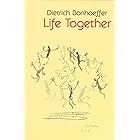| Digital List Price: | $23.99 |
| Kindle Price: | $10.16 Save $13.83 (58%) |
| Sold by: | Amazon.com Services LLC |
Your Memberships & Subscriptions

Download the free Kindle app and start reading Kindle books instantly on your smartphone, tablet, or computer - no Kindle device required.
Read instantly on your browser with Kindle for Web.
Using your mobile phone camera - scan the code below and download the Kindle app.

OK
Letters Papers from Prison Kindle Edition
Dietrich Bonhoeffer was a young German pastor who was executed by the Nazis in 1945 for his part in the “officers’ plot” to assassinate Adolf Hitler.
This expanded version of Letters and Papers from Prison shifts the emphasis of earlier editions of Bonhoeffer’s theological reflections to the private sphere of his life. His letters appear in greater detail and show his daily concerns. Letters from Bonhoeffer’s parents, siblings, and other relatives have also been added, in addition to previously inaccessible letters and legal papers referring to his trial.
Acute and subtle, warm and perceptive, yet also profoundly moving, the documents collectively tell a very human story of loss, of courage, and of hope. Bonhoeffer’s story seems as vitally relevant, as politically prophetic, and as theologically significant today, as it did yesterday.
- LanguageEnglish
- PublisherTouchstone
- Publication dateMay 10, 2011
- File size4979 KB
Customers who bought this item also bought
Editorial Reviews
Amazon.com Review
About the Author
Product details
- ASIN : B004PYDAXG
- Publisher : Touchstone; Updated edition (May 10, 2011)
- Publication date : May 10, 2011
- Language : English
- File size : 4979 KB
- Text-to-Speech : Enabled
- Enhanced typesetting : Enabled
- X-Ray : Enabled
- Word Wise : Enabled
- Sticky notes : Not Enabled
- Print length : 450 pages
- Best Sellers Rank: #246,052 in Kindle Store (See Top 100 in Kindle Store)
- #74 in Spiritual Biography
- #76 in Letters & Correspondence
- #135 in Biographies of Christianity
- Customer Reviews:
About the author

Dietrich Bonhoeffer was born in Breslau in 1906. The son of a famous German psychiatrist, he studied in Berlin and New York City. He left the safety of America to return to Germany and continue his public repudiation of the Naz*s, which led to his arrest in 1943. Linked to the group of conspirators whose attempted assassination of Hitlerr failed, he was hanged in April 1945.
Customer reviews
Customer Reviews, including Product Star Ratings help customers to learn more about the product and decide whether it is the right product for them.
To calculate the overall star rating and percentage breakdown by star, we don’t use a simple average. Instead, our system considers things like how recent a review is and if the reviewer bought the item on Amazon. It also analyzed reviews to verify trustworthiness.
Learn more how customers reviews work on Amazon-
Top reviews
Top reviews from the United States
There was a problem filtering reviews right now. Please try again later.
You will also trace his wrestling with his prison life, and where it might lead. HOWEVER, I highly recommend that before you read LPP that you read Chapter 13 of Bethge's Biography of Bonhoeffer. Unless you do you will get the impression that he thinks his case will be resolved quickly. His letters to his family members often sound optomistic and up-beat, which is far from the truth. His family knew full well his case would probably end up with his execution, but Bonhoeffer wrote to them in a code that they would understand which gave them a much darker expectation. For instance, he often mentions the health of "Uncle Rudy." "Uncle Rudy" is the code for the war raging throughout Germany. There are many such codes in his letters to family which are given so they will pass the Nazi censors. These codes are well explained in Chapter 13 of Bethge's Biography. Many of the letters to Bethge (he was a seminary student years earlier taught by Bonhoeffer) were smuggled out of the prison and bypassed the censors, that's why their content is so much bleaker.
If you want to understand Bonhoeffer at all you must at least read "Letters and Papers from Prison" and then surely read "The Cost of Discipleship."
Top reviews from other countries
A good book to read and read again.









